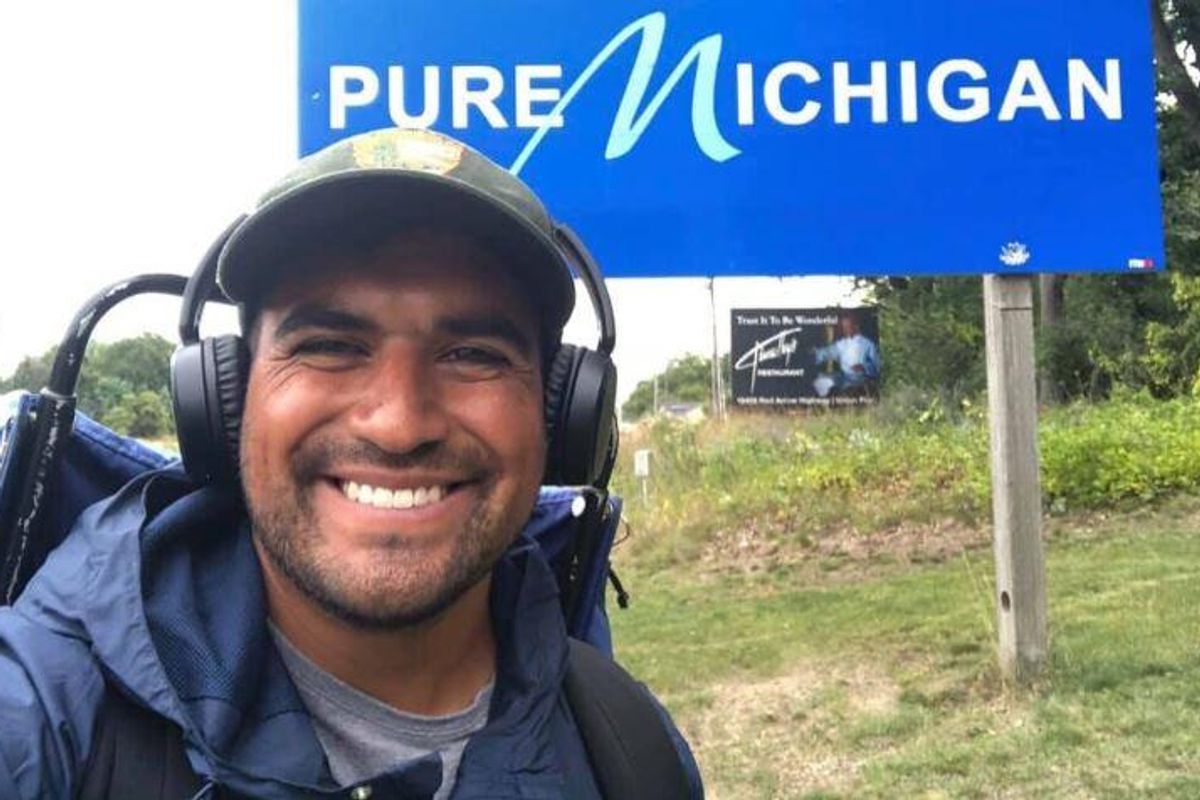
Veteran suicides are on the rise in America. According to the Centers for Disease Control, the suicide rate increased by nearly 36% from 2001 to 2019. Since the onset of the “war on terror” in 2001, more than 30,000 active duty personnel have died by suicide—that’s four times greater than the number killed in action.
Marine veteran Travis Snyder was enlisted in the military for six years and served in Afghanistan as a corporal from October 2017 to April 2018 and is no stranger to the pain of veteran suicide. Snyder lost a friend and fellow veteran to it in 2019.
He’s also had his own mental health struggles.
After leaving the military and losing a friend, he discovered his new purpose in life, to help other veterans dealing with mental health issues.
“Up until that point in my unit, we had lost others before my time of service, but that was my first time experiencing loss up close. Once we lost Jeff I would say I just felt led to do something and walking and hiking was the best thing I knew how to do,” Snyder told WGVU News.
So Snyder decided to do something dramatic. In 2019, he walked 810 miles of shoreline around Lake Michigan in 42 days to raise awareness for mental health resources and veteran suicide prevention. In 2020, he walked 210 miles of shoreline and in 2021, another 200. This year, Snyder had his longest walk of 900 miles around the lake.
Snyder uses the attention he gets from his monumental walks to raise money for Mission 22, a nonprofit that helps veterans with mental health treatment and support.
On all four of Snyder’s walks, he’s been impressed with the kindness of those he’s encountered around the lake.
“The first year I was going to hike, I didn’t tell too many folks what I was doing. I was merely going to commemorate our comrade we lost to suicide and hoped to reach a few people along the way. I had all of my camping gear and was ready to rough it wherever I could,” he told Upworthy.
“However, with help from Facebook, word of mouth, and other platforms, thousands of people have gathered around each venture, with a desire to contribute one way or another; whether it be a meal, a roof, a bed, or just a word of encouragement. I’m very grateful when I share that after four walks and 2240 total miles, I have yet to resort to camping out somewhere for a night. I have always had a bed, or place to stay whether it be a home or hotel,” he continued.
Snyder’s favorite spot on his heroic walks is Fayette Historic State Park in Garden, Michigan.
“At one point it was a bustling community that manufactured iron in the late 19th century, but was abandoned and is now basically a ghost town,” he told Upworthy. “However, the surrounding cliff faces, clear waters, and alluring scenery make it a must. When I went, there was no one around so it really added to the eerie yet beautiful vibe!”
Snyder wouldn’t be able to raise money without Meta tools. He adds a donate button to his Facebook posts which allows his followers to support and donate to the Mission 22 organization. Facebook is the best tool he has for keeping his followers up to date on his walks.
“Thanks to Facebook and the tools and resources that Facebook provides, I was able to set a small stage, and build a small following, a community of folks that want to tie into this cause and contribute in their own way,” Travis has shared.
Facebook also allows people to join him on his journeys.
“I do my best to be consistent and to the point with my posts, so that followers are able to both stay interested and engaged. But also so that they don’t miss anything that I’m sharing; whether that be updates on the walk itself or new information in the world of veteran mental health,” he told Upworthy.
Many of Snyder’s followers on social media are veterans of wars including Desert Storm, Afghanistan and Vietnam.
Snyder hopes his walks will help inspire a dialog about mental health and encourage civilians and vets to have discussions about this challenging topic.

“I hope that the stigma behind the term ‘PTSD’ doesn’t prevent civilians from interacting or being willing to have a conversation with a veteran,” he told Upworthy. “Veterans who experience these mental health injuries are not weak for speaking up, but rather it’s the act of opening up and sharing these experiences that are saving lives, by encouraging more and more to speak up as well.”
He also hopes people learn that PTSD isn’t the only mental health struggle veterans face.
“Mental health challenges come in all forms, and levels of intensity,” he told Upworthy. “Some that experience challenges are working through serious obstacles such as suicidal tendencies, schizophrenia and depression. But some are merely experiencing anxiety, trouble sleeping and stress.”
Snyder is looking to walk even further in 2023 with either a 1,000-mile trek around Lake Michigan or, possibly, a journey around Lake Superior, which would take as long as four months.
“Trust me, the desire is there, and as long as we keep losing our loved ones to suicide,” he told Upworthy, “the calling and the need will continue to be there as well.”
